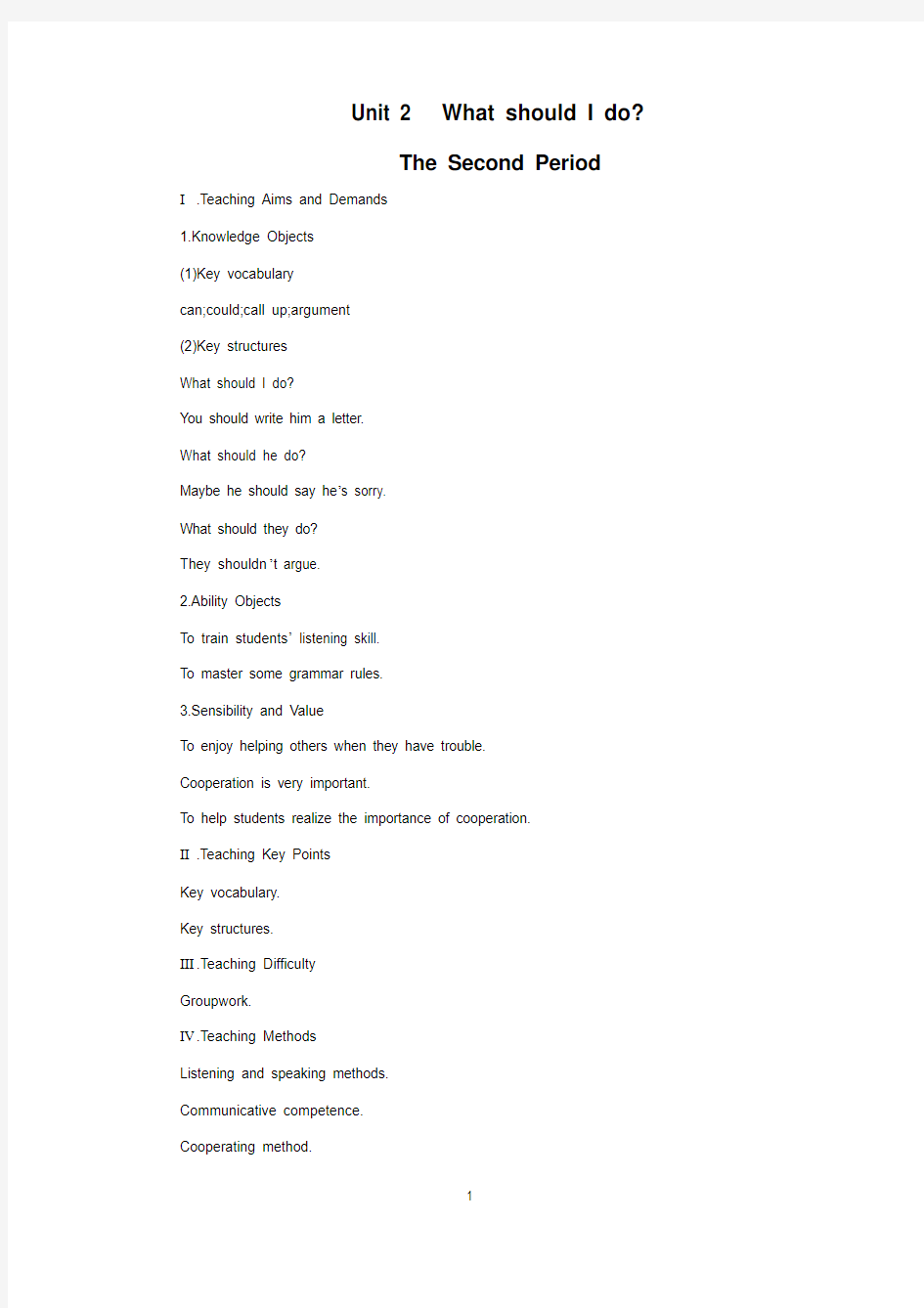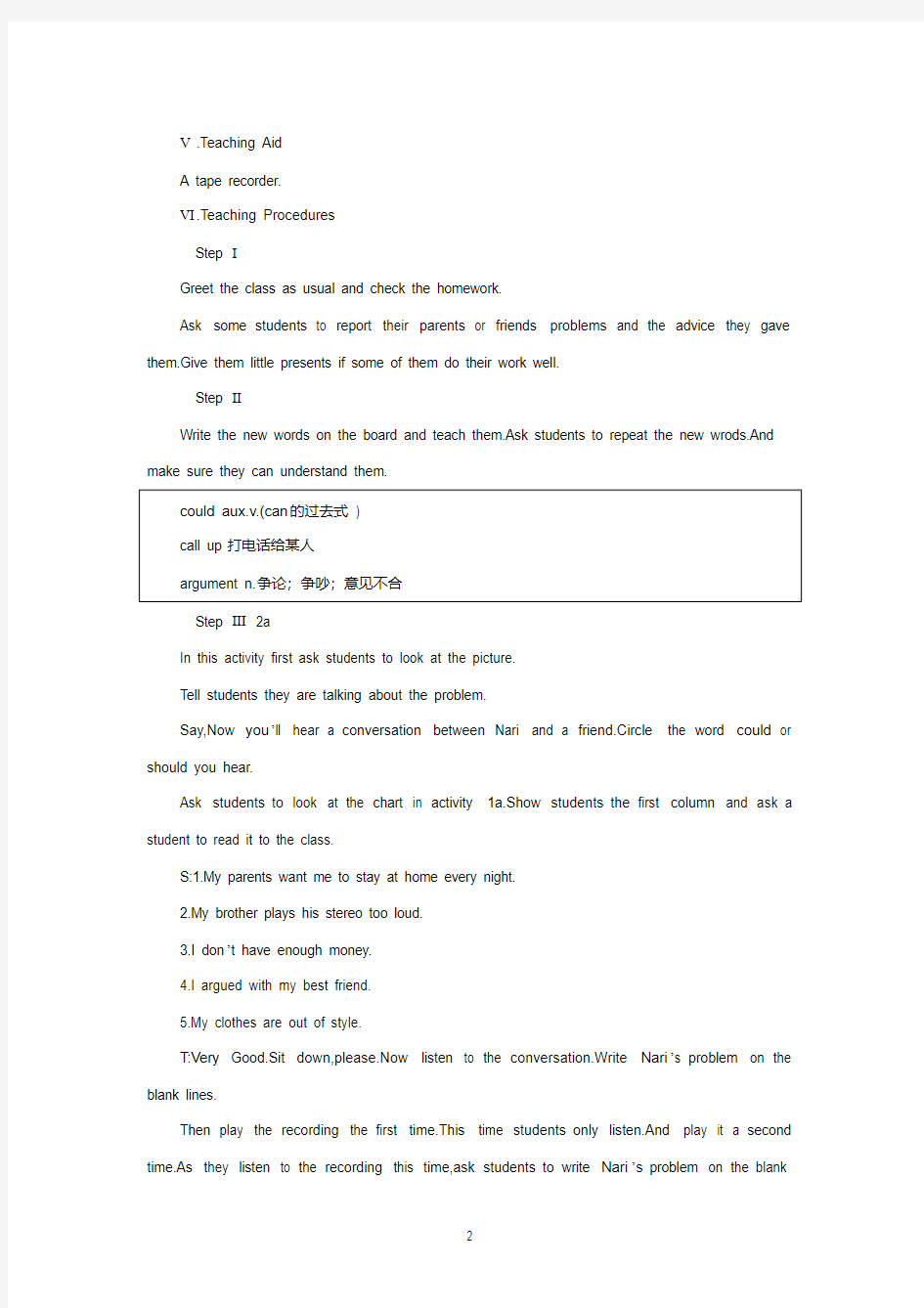人教新目标英语八下Unit2WhatshouldIdo示范教案-the2ndperiod


Unit 2 What should I do?
The Second Period
Ⅰ.Teaching Aims and Demands
1.Knowledge Objects
(1)Key vocabulary
can;could;call up;argument
(2)Key structures
What should I do?
You should write him a letter.
What should he do?
Maybe he should say he’s sorry.
What should they do?
They shouldn’t argue.
2.Ability Objects
To train students’ listening skill.
To master some grammar rules.
3.Sensibility and Value
To enjoy helping others when they have trouble.
Cooperation is very important.
To help students realize the importance of cooperation.
Ⅱ.Teaching Key Points
Key vocabulary.
Key structures.
Ⅲ.Teaching Difficulty
Groupwork.
Ⅳ.Teaching Methods
Listening and speaking methods.
Communicative competence.
Cooperating method.
Ⅴ.Teaching Aid
A tape recorder.
Ⅵ.Teaching Procedures
Step Ⅰ
Greet the class as usual and check the homework.
Ask some students to report their parents or friends problems and the advice they gave them.Give them little presents if some of them do their work well.
Step Ⅱ
Write the new words on the board and teach them.Ask students to repeat the new wrods.And make sure they can understand them.
could aux.v.(can的过去式)
call up打电话给某人
argument n.争论;争吵;意见不合
Step Ⅲ2a
In this activity first ask students to look at the picture.
Tell students they are talking about the problem.
Say,Now you’ll hear a conversation between Nari and a friend.Circle the word could or should you hear.
Ask students to look at the chart in activity 1a.Show students the first column and ask a student to read it to the class.
S:1.My parents want me to stay at home every night.
2.My brother plays his stereo too loud.
3.I don’t have enough money.
4.I argued with my best friend.
5.My clothes are out of style.
T:Very Good.Sit down,please.Now listen to the conversation.Write Nari’s problem on the blank lines.
Then play the recording the first time.This time students only listen.And play it a second time.As they listen to the recording this time,ask students to write Nari’s problem on the blank
lines in activity 2a.
Then check the answers.
Answers
I argued with my best friend.
(This activity provides students listening practice using the target language.)
Tapescript
Boy 1:Hey,Nari,what’s wrong?
Boy 2:I had an argument with my best friend.What should I do?
Boy 1:Well,you could write him a letter.
Boy 2:I don’t think so.I don’t like writing letters.
Boy 1:Maybe you should call him up.
Boy 2:No,I don’t want to talk about it on the phone.
Boy 1:Well,you should say you’re sorry.
Boy 2:Yes,I know I should,but it’s not easy.
Boy 1:Maybe you could go to his house.
Boy 2:I guess I could,but I don’t want to surprise him.
Boy 1:Hey,I know.You could give him a ticket to a ball game.
Boy 2:Well,that’s a good idea,but I don’t have enough money.
Step Ⅳ2b
This activity provides listening practice using the target language.
First read the instructions.Show students the example match.
1.You could write him a letter.I don’t like writing letters.
Ask students to listen again and draw lines to match the advice and the reasons.Like the sample match.
Then play the recording again.
Check the answers.
Answers
1.d
2.e
3.a
4.c
5.b
Step Ⅴ2c Groupwork
This activity provides guided oral practice using the target language.
This activity demands students to role play the conversation between Nari and his friend.
First tell students how to do this activity.
Point to the example in the sample dialogue.Ask two students to read the conversation to the class.
Point out the sentences in activity 2b.Ask two students to role play a conversation between
Nari and his friend using these two sets of sentences.
For example,
S a:What’s the matter,Nari?
S b:I argued with my best friend.
S a:Maybe you could call him up.
S b:I don’t want to talk about it on the phone.
Help the students when necessary.
Then have student work in pairs.First one student is Nari and the other student is Nari’s friend.Then the two students change places.
At the end check the answers by calling on different pairs to say a conversation to the class.Praise them for their good job.
Step ⅥGrammar Focus
Review the grammar box.Ask students to say the questions and the responses.
Point out that the word should is always used to ask for advice,but the words could,should,and shouldn’t are used to give advice.
Explain that the word could is a less serious word than should.Say,When you say someone could do something,it means that your advice is just one idea of many different ideas.When you
say someone should do something,it means that your advice is the best idea or the only https://www.360docs.net/doc/413259807.html,e the word could when you are not very sure of your https://www.360docs.net/doc/413259807.html,e should when you are very sure of your advice.
Step ⅦPronunciation Note
The “t”at the end of the word shouldn’t is usually not pronounced.And the end of the word shouldn’t is often combined with the beginning of the following word.For example,shouldn’t argue does not usually sound like shud-n-tar-gyou.Instead it sounds like shud-n-ar-gyou.You may wish to replay some of the shouldn’t sentences on the recording to demonstrate this pronunciation.
Step ⅧSummary and Homework
This class we listened to a conversation and knew about Nari’s problem and the advice his friend gave him.And we’ve learnt the three words:could,should,shouldn’t.The three words are used to give advice.
After class you can have more practice using the three words to give some advice.
I hope all of you can express yourselves bravely in English.If you do this,you can make great progress.And also I hope you can learn to cooperate happily.
Step ⅨBlackboard Design
Unit 2 What should I do?
new words:
could (can)
call up
argument n.
argue with sb.
